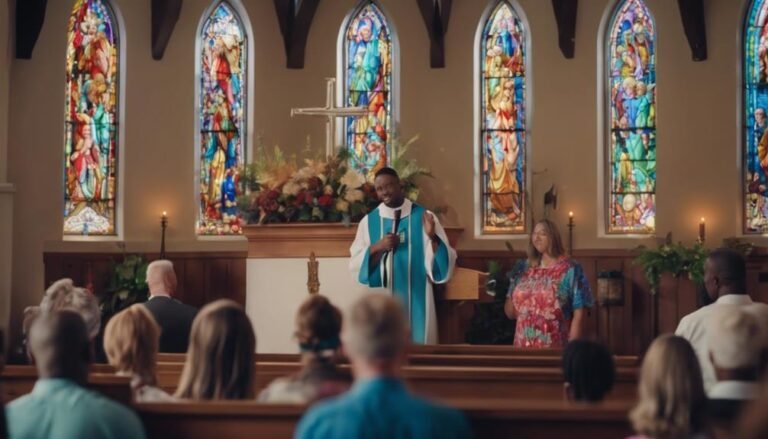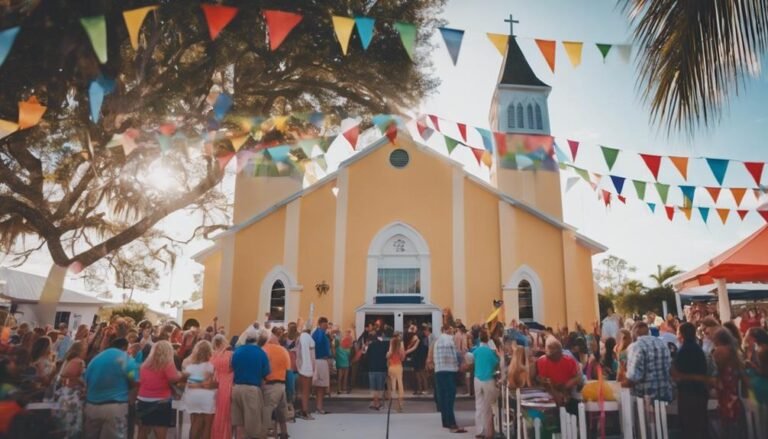When comparing Pentecostalism and Non-Denominationalism, you'll find similarities in their emphasis on spiritual experiences and worship. However, Pentecostal churches have a more structured hierarchy and specific practices like speaking in tongues and divine healing. In contrast, Non-Denominational churches often embrace a flexible structure and diverse beliefs. This distinction highlights the unique characteristics of each denomination, shaping their worship styles and core beliefs. Would you like to explore further to understand the nuanced differences and similarities between these two vibrant branches of Christianity?
Key Takeaways
- Pentecostalism and Non-Denominationalism differ in beliefs and practices.
- Pentecostal churches have more structured hierarchies and defined beliefs.
- Non-Denominational churches offer more flexibility in beliefs and worship styles.
- Both prioritize personal spiritual experiences and a relationship with God.
- While sharing some similarities, they have distinct theological emphases and organizational structures.
Origins and History
When examining the origins and history of Pentecostalism and Non-Denominationalism, it's essential to explore the historical context that shaped these distinct branches of Christianity.
Pentecostal roots can be traced back to the early 20th century, characterized by a fervent belief in the baptism of the Holy Spirit and the manifestation of spiritual gifts, such as speaking in tongues.
Non-Denominational beginnings, on the other hand, emerged as a response to the rigid structures and traditions of traditional denominations.
The historical evolution of Pentecostalism involved a significant emphasis on personal spiritual experiences and direct encounters with the divine, leading to a dynamic and experiential form of worship.
In contrast, Non-Denominational churches sought to create a more inclusive and less hierarchical approach to Christianity, focusing on the unity of believers rather than denominational distinctions.
Both movements reflect a desire for authentic spiritual encounters and a sense of belonging within a community of like-minded individuals.
Beliefs and Practices
The beliefs and practices of Pentecostalism and Non-Denominationalism shape the core theological foundations and worship styles of these branches of Christianity. One significant difference lies in their approaches to baptism. Pentecostals commonly practice water baptism by immersion, viewing it as essential for salvation and often performed in the name of the Father, Son, and Holy Spirit. On the other hand, Non-Denominational churches may vary in their baptismal practices, with some also practicing immersion while others accept different modes such as sprinkling or pouring.
In terms of prayer, Pentecostal services are characterized by fervent, spontaneous prayer often accompanied by speaking in tongues—a practice believed to be the Holy Spirit speaking through individuals. Non-Denominational churches typically have a more relaxed approach to prayer, with spontaneous prayers encouraged but not necessarily involving speaking in tongues as a common practice.
Despite these differences, both Pentecostal and Non-Denominational churches prioritize prayer as a means of connecting with God and seeking His guidance in their lives.
Leadership Structure
In both Pentecostal and Non-Denominational churches, the leadership structure plays a significant role in guiding the congregation and overseeing the spiritual growth and direction of the community.
Here are some key aspects to take into account:
- Decision Making: In both Pentecostal and Non-Denominational churches, decision-making processes often involve input from the congregation, but the final decisions are typically made by the leadership team or the lead pastor.
- Organizational Hierarchy: While both Pentecostal and Non-Denominational churches are known for their relatively flat organizational structures compared to traditional denominations, there's usually a clear hierarchy in place to make certain order and accountability within the church.
- Leadership Roles: Pentecostal churches may have pastors, elders, and deacons, while Non-Denominational churches might've a similar structure or use different titles, but the roles are generally aimed at fulfilling specific functions within the church.
- Collaborative Leadership: In both settings, collaborative leadership is often encouraged, where decisions are made collectively, emphasizing teamwork and unity among the leadership team for the benefit of the congregation's spiritual well-being.
Worship Style
Within Pentecostal and Non-Denominational churches, worship style serves as a significant aspect that reflects the beliefs and values of each congregation. Both Pentecostal and Non-Denominational churches often incorporate contemporary music in their worship services. This style of music, characterized by its modern sound and lyrics, aims to engage worshippers in a more relatable and current manner.
Expressive worship is another common feature in both Pentecostal and Non-Denominational churches. This type of worship emphasizes the freedom for individuals to express their devotion to God openly and passionately. It isn't uncommon to see worshippers raising their hands, clapping, dancing, or even speaking in tongues during these expressive worship sessions.
The use of contemporary music and the encouragement of expressive worship are ways in which Pentecostal and Non-Denominational churches create an atmosphere where worshippers can connect with God on a personal level. These elements play a significant role in shaping the worship experience and fostering a sense of community and spiritual belonging among members.
Views on Spiritual Gifts

Pentecostal and Non-Denominational churches hold differing perspectives on spiritual gifts, influencing their practices and beliefs within the context of worship and community engagement. These views shape how each denomination approaches the manifestation of spiritual gifts in their services and daily lives.
Here are some key aspects differentiating the two:
- Tongues Debate: Pentecostal churches often emphasize speaking in tongues as a sign of the Holy Spirit's presence, while Non-Denominational churches may have varying beliefs on the practice.
- Prophecy Controversy: The role of prophecy in modern times can be a divisive topic, with Pentecostal churches more likely to embrace and encourage prophetic utterances compared to Non-Denominational congregations.
- Healing Miracles: Both denominations believe in healing miracles, but Pentecostal churches may place a stronger emphasis on the direct intervention of God through miraculous healing.
- Discerning Spirits: The ability to discern spirits is valued in both Pentecostal and Non-Denominational churches, but the extent to which this gift is emphasized can vary, impacting how spiritual discernment is practiced within each congregation.
Ecclesiastical Authority
Ecclesiastical authority plays a pivotal role in shaping the organizational structure and decision-making processes within Non-Denominational congregations. Unlike hierarchical denominations with a clear religious hierarchy, Non-Denominational churches often operate with a more decentralized approach to church authority.
In these congregations, the emphasis is typically placed on individual autonomy guided by shared beliefs rather than a strict top-down leadership structure. Church authority in Non-Denominational settings is often vested in a group of elders or pastors who work collaboratively to oversee the spiritual well-being of the community.
While these leaders provide guidance and direction, decisions are frequently made through a process of consensus-building and consultation with the congregation. This decentralized model of ecclesiastical authority allows for a greater sense of ownership and participation among members, fostering a community where individuals feel a deeper connection to the church's mission and values.
Diversity and Autonomy

Diversity and autonomy manifest uniquely in the organizational dynamics of Non-Denominational congregations, shaping how decision-making processes and communal participation unfold within these church communities. When exploring this aspect within Non-Denominational churches, it's essential to take into account the following:
- Unity in Diversity: Non-Denominational congregations often embrace a diverse range of beliefs and practices among their members while working to maintain a sense of unity in their core faith principles.
- Congregational Autonomy: Each Non-Denominational church typically operates independently, with decisions regarding leadership, finances, and worship styles being made at the local level rather than dictated by a centralized authority.
- Community Participation: The autonomy present in Non-Denominational churches fosters a high level of community involvement, where members have the opportunity to contribute actively to the life and direction of the congregation.
- Balancing Independence and Collaboration: Non-Denominational churches navigate the tension between individual autonomy and collective decision-making, seeking to uphold both independence and a sense of communal responsibility.
Frequently Asked Questions
How Do Pentecostal and Non-Denominational Churches Differ in Community Outreach?
When it comes to community outreach, Pentecostal and non-denominational churches often showcase distinct approaches. Pentecostal congregations may emphasize outreach strategies like evangelistic events and spiritual healing sessions, while non-denominational churches may focus on service projects and building local partnerships.
Both have a significant community impact, but the methods vary based on the church's beliefs and priorities. Understanding these differences can help tailor outreach efforts for maximum effectiveness.
Are There Specific Pentecostal or Non-Denominational Rituals for Special Occasions?
For Pentecostal rituals, one fascinating statistic reveals that nearly 90% of Pentecostal churches worldwide celebrate the practice of speaking in tongues during their worship services.
On the other hand, non-denominational celebrations often focus on more contemporary forms of worship, such as live music and multimedia presentations.
These differences in ritual practices highlight the diverse ways in which Pentecostal and non-denominational churches engage with spirituality and community.
What Role Does Music Play in Pentecostal Vs. Non-Denominational Worship Services?
In both Pentecostal and non-denominational worship services, music dynamics have a notable impact on the worship atmosphere.
Pentecostal services often feature lively and spontaneous music, including speaking in tongues and prophetic singing, creating an atmosphere of spiritual intensity.
In contrast, non-denominational services may have a more structured musical approach, incorporating contemporary Christian music to foster a sense of community and connection.
Despite differences, music remains a powerful tool in shaping worship experiences in both settings.
Do Pentecostal and Non-Denominational Churches Have Different Approaches to Evangelism?
When it comes to evangelism strategies, Pentecostal and non-denominational churches often showcase distinct approaches.
While both emphasize outreach programs and mission trips, cultural differences can shape their methods.
Pentecostal churches might focus more on charismatic evangelism, like street preaching or healing services, while non-denominational churches may lean towards relational evangelism, fostering personal connections for outreach.
Understanding these nuances can help tailor evangelism efforts to diverse communities effectively.
How Do Pentecostal and Non-Denominational Churches Handle Financial Matters?
When it comes to financial matters, both Pentecostal and non-denominational churches prioritize financial transparency and effective budget management. Transparency in financial dealings fosters trust within the congregation, while sound budgeting practices help allocate resources efficiently for ministry needs.
Conclusion
To sum up, while Pentecostal and non-denominational churches share some similarities in their emphasis on spiritual gifts and autonomy, they also have distinct differences in their historical origins and leadership structures.
Despite these differences, both traditions continue to thrive and attract followers seeking a vibrant, experiential faith experience.
So, ultimately, whether you find yourself drawn to the enthusiastic worship style of Pentecostalism or the diverse, autonomous nature of non-denominational churches, there's a place for everyone in the tapestry of Christian traditions.






